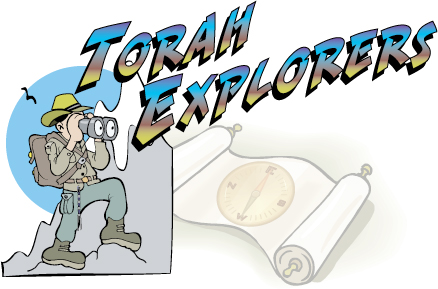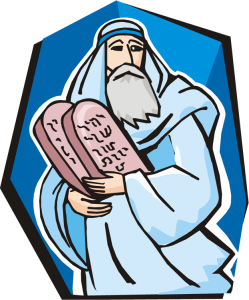Below is a quick overview of the book of Galatians. My explanatory comments are in brackets.
The main theme of the book of Galatians is that one is saved by the grace of Elohim through faith in Yeshua the Messiah, not by the works of the Torah-law. Here, it’s not Paul’s point to discuss the validity of the Torah in a believer’s life. This he does, for example, in the book of Romans. Rather, in Galatians, he discusses how one is saved: Is it by works (i.e., obedience to the Torah and men’s non-biblical religious doctrines), or by the grace of Elohim?
In chapter one, Paul warns against accepting a “different gospel” and shares his personal testimony.
Chapter two describes Paul’s confrontation with Peter about not having to adhere to Jewish (non-Torah) traditions. He then begins to define what the gospel is by asserting that men are justified (made righteous) before Elohim not by the works of the law, but by faith in Yeshua. [This is because a man can never keep the laws of Elohim well enough to measure up to his high standard of righteousness or perfection. This in no way gives man a pass to violate the laws of Elohim — only that man can’t be saved by the good works of Torah-obedience.] Once a man is saved, Yeshua now lives his righteousness through the man [through the help of the Holy Spirit].
In chapter three, Paul further explains the concept of justification by faith stating that this method of salvation goes back to Abraham who trusted Elohim, and because of that faith YHVH accounted him as righteous. At the same time, if one attempts to be justified by the works of the law, because he can’t keep the whole law perfectly, he will fall under the curse or penalty of the law [which is death. Elsewhere we learn the that sin is the violation of the law (1 John 3:4) and the wages or penalty of sin is death (Gal 3:22; Rom 6:23).] Paul goes on to explain that all believers in Yeshua [both Jews and non-Jews] are children of Abraham (v. 28, 29), and so the same salvation model applies to them that YHVH established at the time of Abraham. What then is the purpose of the Torah, Paul asks? It is to bring sinners to the cross of Yeshua [who died in our place to take on himself the penalty for our sins]. [This isn’t the only purpose of the Torah, as Paul teaches us elsewhere. This is the only purpose he mentions in Galatians for the sake of this discussion. The Torah’s other purpose — once we are brought to Messiah because of our sin, which the violation of the Torah — is that it shows us how to walk without sinning; namely how to love Elohim and our fellow man.] Paul concludes this chapter by saying that once the Torah has brought us to Yeshua, we’re no longer under penalty phase of the Torah, and this applies to all people, not just the Jews.
Next in chapter four, Paul explains in more detail the glorious gospel message of salvation by grace. Messiah came to redeem us (set us free) from slavery to sin and the world and to give us a spiritual inheritance as sons of Elohim. He then asks a question. After having received the glorious message of salvation by grace, how can one turn to a works-based salvation and to other non-biblical religious doctrines of men? He then answers the question by using an illustration to make his point. He compares the old or former covenant that YHVH made with the Israelites at Mount Sinai with the new covenant through Yeshua. This was prefigured in Abraham’s two sons: Ishmael and Isaac. The first son (Ishmael) was a result of human effort and brought bondage, while the second son (Isaac) was a result of YHVH’s grace and brought freedom. [Similarly, if one seeks to do Elohim’s will through one’s own effort, it will result in spiritual bondage. On the other hand, if one seeks to do Elohim’s will through his grace and the divine empowerment of the Holy Spirit, it will bring freedom from sin (i.e., Torahlessness) and it’s death penalty.]
In chapter five, Paul exposes the false teachers who were bringing “another gospel.” They were teaching that one can’t be saved, born again, justified or redeemed unless one is physically circumcised. [Although this doctrine is nowhere to be found in the Scriptures, it had become a belief in first-century Judaism. This was hindering the spread of the gospel message among uncircumcised non-Jewish peoples to whom Paul had been commissioned.] Again, Paul restates the idea that salvation is by grace through faith in Yeshua, and that if one seeks to be saved by one’s good works including circumcision, then one must keep the entire law [perfectly without sinning, which is an impossibility]. Evidently, this false teaching was causing much division and strife within the church at Galatia, and Paul urges the believers there to fulfill the Torah-law by loving one another. [Yeshua sums up the entire Torah as loving YHVH with everything and one’s neighbor as oneself (Mark 12:29–31).] Paul admonishes believers to walk according to the Spirit of Elohim that is living in them, which will lead them away from sin (Torahlessness) and towards righteousness (Torah-obedience). Walking in accordance to the leading of the Holy Spirit leads us away from Torahlessness (the works of the flesh including murder, lying, stealing, fornication, uncleanness, witchcraft, idolatry, worldliness and other fleshly passions and desires) and towards righteousness (the fruit of the Spirit).
Paul concludes this letter in chapter six by giving further instructions about living as a follower of Yeshua.



